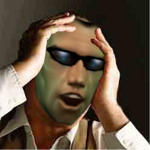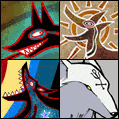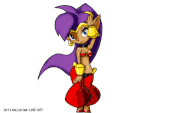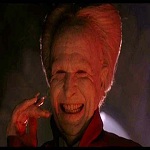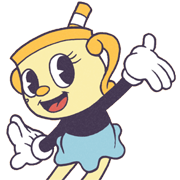|
ImpactVector posted:No, they just disagree with it. For most of 3x there were basically 2 types of classes: "full attack/charge bots" and "spellcasters". IMO that's a lot more sameness than "AEDU + actual meaningfully different class features and power sets".
|
|
|
|

|
| # ? May 10, 2024 07:35 |
|
Babylon Astronaut posted:Heck, you might not even need minis if you are way into mapping. Overhead projector and laser pointer works too. You just need to track tactical movement and positioning, or else many things don't work quite right without massive house-ruling. Hell, you could do it with a white board and some dry-erase markers. Grid-based combat can be stupidly simple and doesn't require a whole suitcase full of models to get poo poo done.
|
|
|
|
Dice as Minis is a long, proud tradition among people who don't want to spring for actual minis.
|
|
|
|
LEGO minifigs make the best minis.
|
|
|
|
PeterWeller posted:Nah, I actually went and checked. Lines 108-110 of Works and Days (Lattimore): "In the beginning, the immortals who have their homes on Olympus created the golden generation of mortal people." The people of gold still reside on Earth as beneficial spirits after their deaths. The people of silver who followed them were destroyed by Zeus because they were fools who would not honor the gods. The Titans are never involved in the story. Weird. In the one I checked says that they lived on Olympus specifically when Cronos was there. "First of all the deathless gods who dwell on Olympus made a golden race of mortal men who lived in the time of Cronos when he was reigning in heaven. And they lived like gods without sorrow of heart, remote and free from toil and grief: miserable age rested not on them; but with legs and arms never failing they made merry with feasting beyond the reach of all evils. When they died, it was as though they were overcome with sleep, and they had all good things; for the fruitful earth unforced bare them fruit abundantly and without stint. They dwelt in ease and peace upon their lands with many good things, rich in flocks and loved by the blessed gods." Of course this isn't really relevant to nerd stories but it's interesting none the less. Eggplant Squire fucked around with this message at 19:32 on Sep 2, 2014 |
|
|
|
|
MonsterEnvy posted:I only got into D&D in like 2009 or something due to the 4e lets play Same. I'd tried to get people in on 3/3.5 (idk what was in the box I bought) years before that and no one (myself included) liked it because it was awfully complicated and gently caress it let's just play Gauntlet Legends on n64 already. Got into 4e after watching it because the combat seemed structured while at the same time you had a lot of freedom as far as decision-making and what you wanted your character to do in the world since it was a ttrpg and not a video game. That's the sort of thing I'm asking though: what about 3.5 (and now 5e) do you like that makes it feel better than 4e (or the reverse, what about 4e makes it feel worse than 3.5/5e)? Surely there's a reason.
|
|
|
|
I didn't like 4e that much since you had all these weird seemingly magical abilities regardless of your class which felt like the party was make up of superheroes instead of somewhat regular people doing extraordinary adventures. Additionally having to keep them all straight got tedious after you accrued a little. Additionally the feat creep was ridiculous with a thousand feats, some of them absolutely required to have a functioning character and other totally pointless unless very specific things happened. So far with 5th ed. from the limited amount I've played they have pulled it way back so it's less crazy, but still giving your some character customization options via the small amount of feats along with backgrounds and skills. I also really like the advantage/disadvantage system of rolling two D20s and taking the higher/lower instead of just adding +2 or whatever to the roll.
|
|
|
|
|
Radish posted:Weird. In the one I checked says that they lived on Olympus specifically when Cronos was there.
|
|
|
|
seebs posted:I get the impression that people are thoroughly sick of the "but all the classes play identically in 4e there's no differentiation at all" line, and are arguing against that, rather than against the claim I'm actually making, which is only that there are more similarities between classes in 4e than in 3e. In 3e, the fighter, the rogue, the ranger, the paladin etc. play practically the same in combat. Out of combat, they are different, but only slightly. Yes, casters play an entirely different game, which is where the whole issue of caster supremacy comes from. 3e is basically caster edition. In 4e, a fighter plays radically different from the rogue, or the paladin or the warlord. Heck, even the sorcerer and wizard are much more different from each other than in 3e.
|
|
|
|
Radish posted:I didn't like 4e that much since you had all these weird seemingly magical abilities regardless of your class which felt like the party was make up of superheroes instead of somewhat regular people doing extraordinary adventures. Additionally having to keep them all straight got tedious after you accrued a little. Additionally the feat creep was ridiculous with a thousand feats, some of them absolutely required to have a functioning character and other totally pointless unless very specific things happened. So far with 5th ed. from the limited amount I've played they have pulled it way back so it's less crazy, but still giving your some character customization options via the small amount of feats along with backgrounds and skills. I also really like the advantage/disadvantage system of rolling two D20s and taking the higher/lower instead of just adding +2 or whatever to the roll. Dealing with the insane numbers of feats and items available is absolutely a problem with 4e, but unfortunately they didn't redesign either system in any meaningful way to keep the same thing from happening again. It's only okay right now because the system just came out.
|
|
|
cbirdsong posted:Dealing with the insane numbers of feats and items available is absolutely a problem with 4e, but unfortunately they didn't redesign either system in any meaningful way to keep the same thing from happening again. It's only okay right now because the system just came out. Yeah I've thought about that and hope they keep it simple. At least now it's not too crazy.
|
|
|
|
|
Radish posted:I didn't like 4e that much since you had all these weird seemingly magical abilities regardless of your class which felt like the party was make up of superheroes instead of somewhat regular people doing extraordinary adventures. Additionally having to keep them all straight got tedious after you accrued a little. Additionally the feat creep was ridiculous with a thousand feats, some of them absolutely required to have a functioning character and other totally pointless unless very specific things happened. So far with 5th ed. from the limited amount I've played they have pulled it way back so it's less crazy, but still giving your some character customization options via the small amount of feats along with backgrounds and skills. I also really like the advantage/disadvantage system of rolling two D20s and taking the higher/lower instead of just adding +2 or whatever to the roll. Don't worry, it'll bloat up soon enough.
|
|
|
|
Radish posted:Yeah I've thought about that and hope they keep it simple. At least now it's not too crazy. There is 0% chance that feat/class/ability/spell bloat isn't going to be a thing in 5th edition.
|
|
|
|
Radish posted:I didn't like 4e that much since you had all these weird seemingly magical abilities regardless of your class which felt like the party was make up of superheroes instead of somewhat regular people doing extraordinary adventures. I'd be more understanding of this view if Wizards/casters in general weren't akin to gods in other editions.
|
|
|
Generic Octopus posted:I'd be more understanding of this view if Wizards/casters in general weren't akin to gods in other editions. I started in 4e (played all of one 3e game) so that's my frame of reference. In regards to future bloat welp 
|
|
|
|
|
So I made a Archer path for the Fighter based on Tactics Ogre Archer, on a whim. I did this in 15 minutes with no knowledge of how game design, so I expect to be told how crappy it is soon. Tactics Ogre Archer Level 3 – Tremendous Shot : Spend an Action preparing your shot. The next shot you make with a ranged weapon auto-hits with a Critical Hit. Level 7 - Choose one of the special attacks from the following list. They can be used as long as the archer does not move during his turn. They deal triple normal arrow damage and have another effect. The DC for saves against these effects is equal to 8 + Proficiency Bonus + Archer’s Dexterity bonus. Dark Weight (bow): The target’s speed is halved. No saves. Slumber Shot (bow): The Target is put to Sleep. Flaming Blast (bow): Damage is considered Fire. The target is Charmed. Empyreal Shot (bow): Damage is electricity. The target is Stunned. Brimstone Hail (crossbow): Damage is only double damage but hits a circle of 10-foot radius. Dullbind (crossbow): Target is Restrained. Death Wail (crossbow): Roll attacks three times against target. Sanctum Flare (crossbow): Target is Paralyzed. Level 10 – Eagle Eye: Spend an action to make sure the next ranged attack of all allies in a 15-feet radius Auto-Hit. Roll only to determine critical hits. Level 15 – Double Shot: Whenever an Archer attacks with a ranged weapon, he can make one more normal attack for free. Level 18 – Another Special Attack is chosen. They can be used while moving now.
|
|
|
|
Radish posted:I didn't like 4e that much since you had all these weird seemingly magical abilities regardless of your class which felt like the party was make up of superheroes instead of somewhat regular people doing extraordinary adventures. Can we get some hard quotes from any edition of D&D that says you are a Regular Joe Pleb? Last I recall, 3e actually had strictly inferior NPC classes that 'normal people' use, just to drive home the point that you are 'special' -- however awkwardly. quote:Level 3 – Tremendous Shot : Spend an Action preparing your shot. The next shot you make with a ranged weapon auto-hits with a Critical Hit. My only gripe with this is that at later levels your time will be better spent making multiple attacks for damage instead of one attack with a guaranteed crit. Still, very cool for low levels and very thematic. Strength of Many fucked around with this message at 19:54 on Sep 2, 2014 |
|
|
|
Strength of Many posted:Can we get some hard quotes from any edition of D&D that says you are a Regular Joe Pleb? Last I recall, 3e actually had strictly inferior NPC classes that 'normal people' use, just to drive home the point that you are 'special' -- however awkwardly. Which was funny because the NPC caster classes were still way better than the PC martials.
|
|
|
|
The NPC Expert class was better than the core martials.
|
|
|
|
Radish posted:I started in 4e (played all of one 3e game) so that's my frame of reference. Basic/BECMI (or Dark Dungeons, a free retroclone; Darker Dungeons is the same with some slight tweaks) and Dungeon World work better for me for the "better-than-average joes go on awesome adventures" thing.
|
|
|
|
Radish posted:I didn't like 4e that much since you had all these weird seemingly magical abilities regardless of your class which felt like the party was make up of superheroes 4e was very careful to keep the martial power source very thematic and non-magical.
|
|
|
|
4E was explicit that the PCs were powerful heroes- even those with no power source beyond 'being really good with weapons/acrobatics' were still supposed to be, from level one, exceptional.
|
|
|
|
If it's worth the opinion, I really like low level DnD campaigns because I like feeling like a real guy in a real world that is rising to a cause or caught up in some poo poo. 4e doesn't really offer that. It does, but it seems mostly high fantasy and high key. Knocking some zombies around is an obstacle in 4e, whereas in 5e it can be the death of your character if you're unlucky. Anyway, that said, that feeling completely falls apart at any level past 5 and isn't necessarily what DnD is about, so I don't hold it against 4e.
|
|
|
|
Radish posted:Weird. In the one I checked says that they lived on Olympus specifically when Cronos was there. When Cronos reigned in heaven, not on Olympus. It's an important distinction. The "deathless gods who live on Olympus" are specifically the Olympian pantheon, distinct from the Titans by their immortality and their dwelling place. So it reads like a weird paradox where the gods retconned man into existence during the time of their predecessors. One possible solution is that it's a mistake in both our translations. Zeus is throughout the poem called Son of Cronos and Cronos(ian) King. Another more likely solution is that Hesiod is playing loose with continuity here to both establish the Olympians authority over people being original and paramount, and still place the first generation of people far enough back in the mythic past for it to be impossible to claim descent from them (remember, this poem comes from a time when political authority derived from claims of divine heritage). You're right, though, this has very little to do with elf games, though fans of 4E's obscured origins for humans may find it interesting that Theogony, Hesiod's other great poem that takes continuity very seriously as it sketches out the divine family tree, says nothing about man's origin. If you have any idea about ancient Greek sexual politics, you can guess what it says about woman's origin.
|
|
|
|
dichloroisocyanuric posted:If it's worth the opinion, I really like low level DnD campaigns because I like feeling like a real guy in a real world that is rising to a cause or caught up in some poo poo. The same world that has elves, dwarfs, dragons, kobolds, orcs and goblins, flying invisible glitterdust spamming wizards, and pedantic gods who grant and take magic away from people who can heal you back from fatal trauma to perfectly fine in an instant, reliably,all of the time? This is what feels like the Real World to you? edit: all of those I mentioned above are present, possible and likely to happen in a level 1-5 game.
|
|
|
|
Strength of Many posted:The same world that has elves, dwarfs, dragons, kobolds, orcs and goblins, flying invisible glitterdust spamming wizards, and pedantic gods who grant and take magic away from people who can heal you back from fatal trauma to perfectly fine in an instant, reliably,all of the time? No. Because I didn't say the Real World. I said a real world. As in, one that feels coherent with itself. Edit: I've also already posted in here multiple times that I like low fantasy settings, so this is obviously just My Opinion. opulent fountain fucked around with this message at 20:08 on Sep 2, 2014 |
|
|
|
ProfessorCirno posted:Because the only "gap" that's different is that now non-spellcasters have resources, and the ones that complained were the non-spellcasters who were super upset that the pleb dirt farmer classes got to hobnob with their elite wizardkings. It's a difference but only on the most shallow glance imaginable, because it's like complaining that, see above, all the classes in TF2 are "all the same" because they have the same number of weapons. It's the most shallow, stupid complaint you can give. If you dislike AEDU and wanted non-AEDU options that's one thing but that was never how it was presented. It was always "boo hoo hoo fighters can do things now." It's the same complaint as "Tome of Battle characters are just spellcasters in armor!" Most of these motherfuckers hated every supplement in 3e that added new resource management options. Yeah, I'm familiar with the genre, I spent a lot of time defending 4e on Usenet. I may have sort of permanently offended a number of people who hated 4e. I still think that there's some truth to some of the criticisms, just not enough to make claims like "everything feels the same" particularly convincing to me. They certainly didn't "feel the same" to me. They did, however, feel less-different. Which was fine by me.
|
|
|
|
dichloroisocyanuric posted:As in, one that feels coherent with itself. ... but its usually not. For the same reasons I mentioned above. Alignment behavior alone throws this for a loop.
|
|
|
sarmhan posted:4E was explicit that the PCs were powerful heroes- even those with no power source beyond 'being really good with weapons/acrobatics' were still supposed to be, from level one, exceptional. Yes and I prefer the alternative of just attacking stuff and having exceptional things much rarer than at wills but it's an opinion not hard fact I'm trying to push. PeterWeller posted:When Cronos reigned in heaven, not on Olympus. It's an important distinction. The "deathless gods who live on Olympus" are specifically the Olympian pantheon, distinct from the Titans by their immortality and their dwelling place. This kind of stuff is really interesting so thanks for the discussion! Generic Octopus posted:Basic/BECMI (or Dark Dungeons, a free retroclone; Darker Dungeons is the same with some slight tweaks) and Dungeon World work better for me for the "better-than-average joes go on awesome adventures" thing. This sounds cool but it's really hard to get my group to do non D&D stuff. 
|
|
|
|
|
Littlefinger posted:This, too, is untrue. Hmm. I have not at all experienced the martials playing "practically the same" in combat in 3e. I mean, sneak attack. The rogue's positioning can move them from "really, why are you bothering to attack, it's not going to matter" to "welp, that one's dead". Fighter positioning does not in general have comparable effects. But I'm mostly talking about the huge martial-vs-caster gap in how 3e plays; "entirely different game" is maybe a little stronger than I'd put it, but... Not much stronger than I'd put it. In 4e, they were clearly playing the same game, at which point the differences in tactical choices and priorities become much clearer, because you're no longer looking at two characters with essentially unrelated play mechanics.
|
|
|
|
Radish posted:Yes and I prefer the alternative of just attacking stuff and having exceptional things much rarer than at wills but it's an opinion not hard fact I'm trying to push. Then don't play D&D. Or play D&D with nothing but Fighters. At this point you're hunting for some nebulous concept that has never been and never will be. seebs posted:But I'm mostly talking about the huge martial-vs-caster gap in how 3e plays; "entirely different game" is maybe a little stronger than I'd put it, but... Not much stronger than I'd put it. In 4e, they were clearly playing the same game, at which point the differences in tactical choices and priorities become much clearer, because you're no longer looking at two characters with essentially unrelated play mechanics. But they do have completely unrelated play mechanics. Defenders alone mark and enforce marks in completely different ways.
|
|
|
|
The Commoner, Aristocrat and Warrior were strictly inferior to most PC classes. The Expert had niche uses as a skill monkey due to knowing every skill, and Magewright and Adept were good enough casters to stay competitive with lower-mid tiered martial classes. Of course, there's no reason not to just play a Factotum, Wizard or Cleric instead.
|
|
|
|
Radish posted:This sounds cool but it's really hard to get my group to do non D&D stuff.
|
|
|
|
ImpactVector posted:No, they just disagree with it. For most of 3x there were basically 2 types of classes: "full attack/charge bots" and "spellcasters". IMO that's a lot more sameness than "AEDU + actual meaningfully different class features and power sets". Ohhh, interesting. To me, the "not-at-all-same" comes from the caster/non-caster thing, and maybe to a lesser extent among spellcasters from the prepared/spontaneous thing. (Pathfinder's addition of Oracle helps highlight which things are prepared/spontaneous caster changes, and which are sor/wiz vs. divine changes.) So basically, I'm looking at that "basically an entirely different game" thing, where the party martials are all built around ways to get large bonuses and then make full attacks, often with a focus on getting crits so they can multiply all the non-die-roll bonuses, while the casters are off playing "let's remake the field of battle entirely". I mean, epic-level PF, the samurai can do >1300 damage in a round to a single target, I think the wizard's never managed to break ~250 in a round. But! The wizard has one-shotted a fair number of opponents by, say, causing them not to be on our plane of existence anymore. So the question is, if I'm used to one character class, can I play another reasonably competently, or do I have to relearn most stuff? 3e, going from fighter to a caster, I'm going to be completely clueless if I haven't played a caster. 4e, I can just read the powers, think about them a bit, and be pretty much good to go. And keep in mind, I think that's a strength of 4e, overall.
|
|
|
|
Nihilarian posted:The Commoner, Aristocrat and Warrior were strictly inferior to most PC classes. The Expert had niche uses as a skill monkey due to knowing every skill, and Magewright and Adept were good enough casters to stay competitive with lower-mid tiered martial classes. I think you mean Druid, Wizard or Cleric. 
|
|
|
|
Strength of Many posted:But they do have completely unrelated play mechanics. Defenders alone mark and enforce marks in completely different ways. I am not at all seeing this as "unrelated play mechanics". That they are all using the marking mechanic to begin with makes me think of them as structurally similar to each other, and everyone's got that same basic mechanic for how they use their powers, what resource management they have... So far as I can tell, and I admit I could be missing something, there's no gap between any two classes in 4e remotely comparable to the 1e/2e/3e gap between "casters can nova but are basically useless when they have used up their spells" and "martials have no novas but can go forever". In 4e, everyone has (by a couple levels in, at least) a mix of abilities such that they can be low on their Good Stuff, after a few encounters, but will still have decent options up for any new encounter, because they can use up dailies and still have encounter powers left. In 3e, a fighter has exactly the same options after 20 encounters and down to 1hp that they did when they started out. So that strikes me as a much larger difference. Okay, time for the car analogy. Well, the car analogy analogy. The claim I'm making is that in 3e, class difference is roughly comparable to the diffferences between cars and horses, and in 4e, it's more like the differences between breeds of horses. And you're pointing out how ridiculously large the variance between breeds of horses is, and I totally agree that it is a huge variance. But it's not, to my mind, even close to being as large as the difference between cars and horses.
|
|
|
|
Strength of Many posted:... but its usually not. For the same reasons I mentioned above. Alignment behavior alone throws this for a loop. Except it can certainly feel that way at low levels when you're not fighting dragons or contradictory gods or whatever else. In fact, that was the entire point of my post! I even went on to clarify things that you're trying to point out to me. Sadly, as for Dungeon World, I like a little bit more crunch than that in my systems. I should check the others mentioned out, though. Might be exactly what I'm looking for.
|
|
|
|
seebs posted:I am not at all seeing this as "unrelated play mechanics". That they are all using the marking mechanic to begin with makes me think of them as structurally similar to each other, and everyone's got that same basic mechanic for how they use their powers, what resource management they have... This discussion seems to me like a semantic mismatch. When you're saying "style of play" you mean "mechanisms used to interact with combat," which are standardized, yes, and that's a good thing, yes. Other people are using "style of play" to mean "subjective experience and objective tactical goals and values" which does vary hugely.
|
|
|
Strength of Many posted:Then don't play D&D. Or play D&D with nothing but Fighters. At this point you're hunting for some nebulous concept that has never been and never will be. 5th feels fine to me so far so I'll play that. Babylon Astronaut posted:BECMI is D&D. Rules Cyclopedia is the all in one book form. It's my favourite edition, and Dark Dungeons is a clone. The differences are very, very small besides the cool fun way to do initiative. Sounds cool I'll try and look into that one.
|
|
|
|
|

|
| # ? May 10, 2024 07:35 |
|
Radish posted:This kind of stuff is really interesting so thanks for the discussion! My pleasure! I love Greek Myth, especially the stuff that comes from their oral culture because it really shows how they saw their daily interaction with the metaphysical world. Works and Days is basically an almanac or oral "handbook" for the right way to be a Greek landholder, for example. I think stuff like that is essential reading for DMs who want to bring their pantheons to life.
|
|
|






